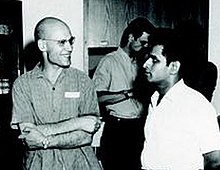S. S. Abhyankar
| Shreeram Shankar Abhyankar | |
|---|---|

Shreeram Abhyankar (right) with Alexander Grothendieck (left), Michael Artin in the background, at Montreal, Canada in 1970.
|
|
| Born |
July 22, 1930 Ujjain, India |
| Died | 2 November 2012 (aged 82) West Lafayette, Indiana, USA |
| Citizenship | United States |
| Fields | Mathematics |
| Institutions | Purdue University |
| Alma mater |
University of Mumbai Harvard University |
| Doctoral advisor | Oscar Zariski |
| Doctoral students |
|
| Known for | Abhyankar's conjecture, Abhyankar's lemma, Abhyankar–Moh theorem |
| Notable awards | Chauvenet Prize (1978) |
Shreeram Shankar Abhyankar (22 July 1930 – 2 November 2012) was an Indian American mathematician known for his contributions to algebraic geometry. He, at the time of his death, held the Marshall distinguished professor of mathematics chair at Purdue University, and was also a professor of computer science and industrial engineering. He is known for Abhyankar's conjecture of finite group theory.
His latest research was in the area of computational and algorithmic algebraic geometry.
Abhyankar was born in Ujjain, Madhya Pradesh, India. He earned his B.Sc. from Royal Institute of Science of University of Mumbai in 1951, his A.M. at Harvard University in 1952, and his Ph.D. at Harvard in 1955. His thesis, written under the direction of Oscar Zariski, was titled Local uniformization on algebraic surfaces over modular ground fields. Before going to Purdue, he was an associate professor of mathematics at Cornell University and Johns Hopkins University.
Abhyankar was appointed the Marshall Distinguished Professor of Mathematics at Purdue in 1967. His research topics include algebraic geometry (particularly resolution of singularities, a field in which he made significant progress over fields of finite characteristic), commutative algebra, local algebra, valuation theory, theory of functions of several complex variables, quantum electrodynamics, circuit theory, invariant theory, combinatorics, computer-aided design, and robotics. He popularized the Jacobian conjecture.
...
Wikipedia
